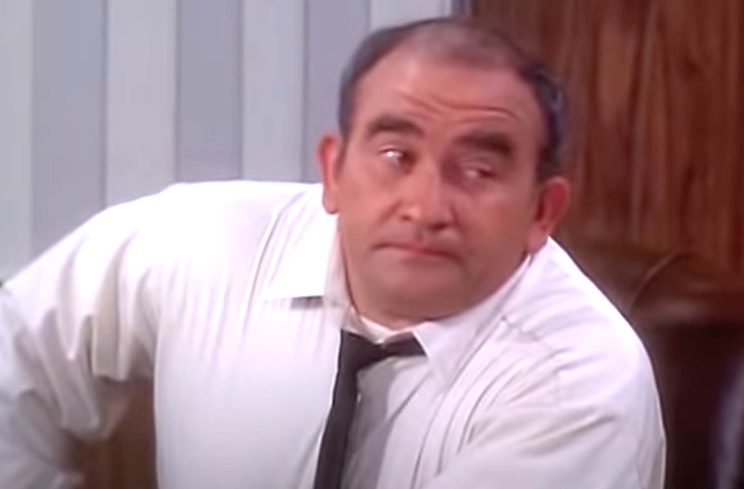The Late Ed Asner’s Lou Grant Character Showed the Public What Journalism Should Be

News broke over the weekend that actor Ed Asner passed away at the age of 91. His acting career was no doubt illustrious, and his political activism is also noteworthy. And while my sons know him best for his role as Santa Claus in the seasonal favorite Elf, he has a pretty significant journalistic legacy as well, given his role as Lou Grant, the uncompromising newsroom boss whose influence on cultural and social mores cannot be overlooked.
Analyzing the influence of fictional characters is a tricky business. Not only is the practice purely subjective, but the credit for the legacy is shared amongst a creative crew of writers, producers, and the actor. Putting that all aside, the character of Lou Grant in The Mary Tyler Moore Show was a tough but fair journalistic leader. But he was also someone from the Greatest Generation (unafraid to drink booze at his desk and ask interview questions that would get him fired today) who was adaptable and supportive of the start of the modern feminist movement embodied by the titular role played by Mary Tyler Moore.
Viewers were introduced to the Lou Grant character in the first episode of the iconic show, in a scene showing a job interview. Asner’s portrayal of the TV news boss at WJM-TV, a fictional local news show in Minneapolis, was by turns grumpy, no-nonsense, and skeptical of anything before him. His job interview with Moore, an aspiring employee, featured questions about age, religion, and marital status that would now be considered taboo. Moore handles them with humor and grace. The clip is best known for Asner’s delivery of “you got spunk,” followed by “I HATE spunk.” The dynamic between the two characters across seven seasons was wonderfully set in motion from this initial encounter, which you can see below.
When Mary Tyler Moore passed a few years ago, many remembered her pioneering role as a single woman who placed a remarkable career ahead of household roles traditionally expected of women. Never before did a television show emphasize those priorities, and she was appropriately lauded for it. Lou Grant’s gradual acceptance and appreciation of her character’s independence also deserves mention, as it signaled to viewers that this was not just normal, but laudable.
One of the more remarkable facets of The Mary Tyler Moore Show was Lou Grant’s evolution over seven seasons from 1970 to 1977. And yes, I am old enough to recall watching every episode on Saturday nights on CBS during that run, which was followed by an equally genius The Bob Newhart Show and The Carol Burnett Show. It was a golden era of smart comedy programs named for their leading actors.
But many overlook Asner’s more serious turn in the hour-long newspaper drama Lou Grant. Asner played the role of the editor in chief of the fictional newspaper Los Angeles Tribune, and his character necessarily evolved from the WJM-TV news boss, which was played for comedic effect. The show was smart, wonderfully cast, and featured plot lines that showcased both ethical dilemmas for a news outlet, but also the role that newspapers play in local government, broader politics, and industry. It is not hyperbole to say that season five of The Wire shares some DNA with Lou Grant, a mostly overlooked relic of the late 1970s.
Yes, the dramatic portrayal of local and journalistic issues was rather two-dimensional compared to the high-end dramatic series we are all accustomed to binge-watch. But Lou Grant was much smarter than it needed to be, as was the titular character, who demonstrated a deft touch and nuance in balancing local coverage with the business of publishing.
My memories of Ed Asner playing Lou Grant might be clouded. They are one and the same with the terrific nostalgia of watching television with my family and laughing out loud at sharp, funny, well-written comedy (cheers to James Brooks!) My father, who passed away when I was 17, shared a similar mien to Lou Grant, a fact which I’m sure figures into my emotional response. It is not a coincidence that I own a t-shirt with the WJM-TV logo and one with Lou Grant’s face a la Che Guevara. No apologies.
But it cannot be underestimated just how influential Asner’s portrayal of Lou Grant, in both a three-camera sitcom and an hour-long drama, was with many journalists of a certain age. He was tough but fair. Principled yet adaptable. Strong-willed but able to laugh at the absurdities of life (such as the funeral of the beloved Chuckles the Clown.)
Lou Grant not only embraced the career of Mary Tyler Moore but also served as a mentor, at a time when that sort of thing was often mocked. He was, above all else, about treating people equally and telling their stories fairly.
At a time when journalistic integrity is increasingly more difficult to come by, that is a legacy worth celebrating.
This is an opinion piece. The views expressed in this article are those of just the author.





Comments
↓ Scroll down for comments ↓